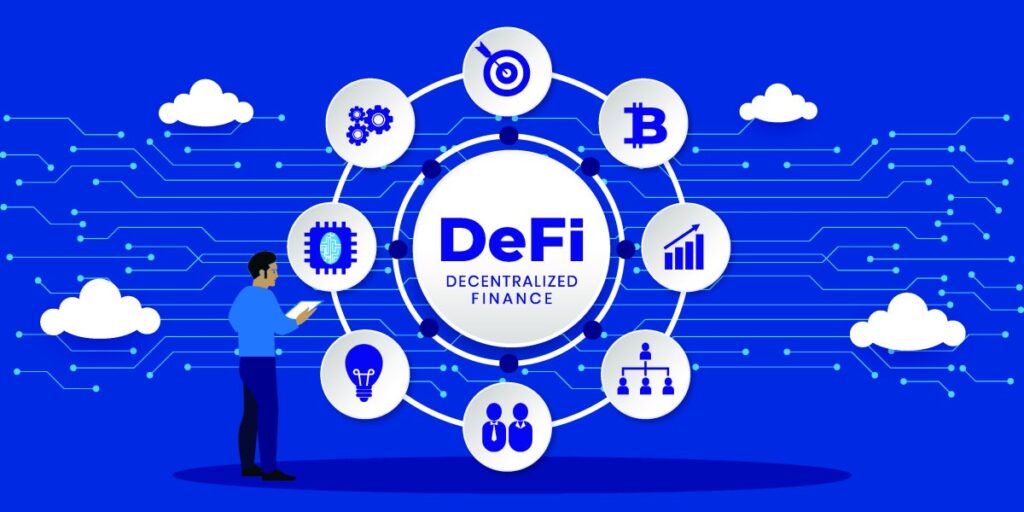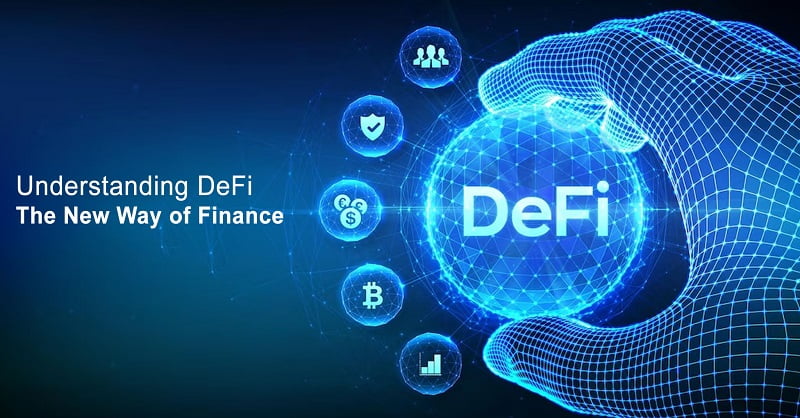What is DeFi?
A financial technology based on secure distributed ledger similar to those used by cryptocurrencies is known as decentralized finance (Defi). It is a collective term for financial products and services that are accessible to anyone with internet connection and who can use Ethereum. DeFi aims to democratize finance by replacing centralized institution and legacy with peer- to- peer relationships that can provide a full spectrum of financial services, from everyday banking, loans and mortgages, to complicated contractual relationships and asset trading.
Historical context of Defi
Bitcoin in many ways was the first Defi application. With bitcoin, you can really own, control value and send it anywhere around the world. It does this by providing a way to a large number of people, who don’t trust each other, to agree on a ledger of accounts without the need for a trusted intermediary. No one has the authority to change bitcoin rules and it is open to everyone. Bitcoin rules are written into the technology. Its not like traditional finance where governments can print money that devalues your savings and companies can shut down markets. Like Bitcoin, in Ethereum, everyone has access to it and the rules can’t be changed. But it also makes this digital money programmable, using smart contracts, so you can go beyond storing and sending values.
Programmable money is more just a default feature of tokens on Ethereum. Anyone can program logic into payments, so you can get the security and control of bitcoin mixed with the services provided by financial institutions. This will let you do things with cryptocurrency that you can’t do with Bitcoin like lending and borrowing, scheduling payments, investing in index funds and more.

Comparison of Defi and traditional finance
| Decentralized Finance | Traditional Finance |
| Just connect a digital wallet., no need to disclose personal details. | Users must share personal data, which is vulnerable to security breaches. |
| You hold your money and even controls it, where it goes and how its spent | Your money is held by companies and you have to trust them, not to mismanage it like lending money to risky borrowers. |
| The DeFi markets operate 24/7/365. | The hours of operation are limited. |
| Defi is open to anyone. | You must apply to use financial services. |
| Transfer of funds happen in minutes. | Payments can take days due to manual processes. |
What can you do with Decentralized Finance DeFi?
- Send money around the world
- Store money using crypto wallets
- Borrow and lend money on a peer-to-peer level
- Trade cryptocurrencies anonymously and at any time 24/7
- Trade tokenized versions of investments such as stocks, funds and other financial assets.
- Crowdfunding
- Buying insurance with the help of companies such as Etherisc
How do people make money with Decentralized Finance DeFi?
People are using more than one way to make money with DeFi. Like:
- Generate passive income by using Ethereum based lending apps. Essentially users loan out their money and generate interests from the loans.
- Yield farming, in which users scan through myriad of DeFi tokens in the hopes of finding opportunities for larger returns, but it is complicated and can lack transparency.
- Anything from payments, trading securities and insurance, to lending and borrowing are already happening with DeFi.
- E-wallets, DeFi developers are developing digital wallets that can operate independently of major cryptocurrency exchanges, providing investors with access to various cryptocurrency and blockchain-based games.

What does decentralized finance do?
The goal of DeFi is to challenge is to challenge the use of centralized financial institutions and third parties involved in all financial transactions.
Is Bitcoin part of Decentralized Finance?
Is Bitcoin part of Decentralized Finance?
Bitcoin is a cryptocurrency. DeFi is designed to use cryptocurrency in its ecosystem, so Bitcoin isn’t DeFi as much as it is a part of it.
Is it safe to invest in DeFi?
DeFi investments involve purchasing cryptocurrency used in DeFi, which is susceptible to hacking. Despite a drop in 2023, the trend is expected to reappear, but with significant risks involved.
Risks and downsides of DeFi Token
DeFi is an emerging phenomenon that comes with many risks. Some of the DeFi risks include:
- Decentralized finance, a recent innovation, has not been extensively tested and national authorities are scrutinizing its systems for regulation.
- DeFi’s success relies on lack of rules and regulations, leaving users with limited recourse in case of transactions.
- Unlike centralized finance, DeFi lacks similar protections like Federal Deposit Insurance Corp. (FDIC) reimbursements and capital reserves.
- Hacking poses a significant threat to DeFi’s software systems, potentially leading to funds theft or loss.
- Collateralization is a crucial aspect of DeFi lending transactions, requiring at least 100% of the loan’s value to secure the loan. This restricts eligibility for many types of DeFi loans.
- Private key requirements are also essential for storing cryptocurrency assets in wallets. These keys are unique codes known only to the wallet owner, and losing a private key result in losing access to funds.
Rise of DeFi Token
DeFi, a decentralized financial ecosystem, challenges traditional centralized institutions by utilizing blockchain technology to offer a range of services without intermediaries. It aims to provide open, permissionless access to financial tools, allowing anyone with an internet connection to participate in this borderless financial ecosystem.
What is the future of DeFi?
DeFi technology, which transforms basketball clips into digital assets with monetary value, holds great promise for investors. However, security concerns remain a challenge. Future developments include monitoring tools, insurance, and other security initiatives. Smart contract insurance is gaining importance in the DeFi sector. Stablecoins are expected to grow, especially in hyperinflation-prone countries. DeFi is shifting services from banks to financial institutions, creating a more accessible financial system. To fully realize DeFi’s potential, it is crucial to continue educating people and developing tools to see it for themselves.
What is the DeFi impact on financial world?
Decentralized Finance (DeFi) is a revolutionary financial system that uses blockchain technology and smart contracts to create open, permissionless networks. It eliminates the need for traditional financial intermediaries, allowing peer-to-peer transactions and services without intermediaries. DeFi expands access to financial services, particularly for unbanked and underbanked populations, democratizing finance and promoting global financial inclusion. The system operates on public blockchains, providing transparency, trust, and security. Smart contracts enable programmable financial instruments, leading to new financial models like automated market makers (AMMs), yield farming, and flash loans.
DeFi platforms also provide greater liquidity through decentralized exchanges (DEXs) and liquidity pools, facilitating smoother market operations. However, DeFi presents challenges such as smart contract vulnerabilities, regulatory uncertainties, and market manipulation. The rapid growth of DeFi has significant implications for the economy, stimulating economic activity and innovation. As DeFi evolves, it will likely drive further changes in the global financial system, influencing how financial services are provided, regulated, and consumed.




